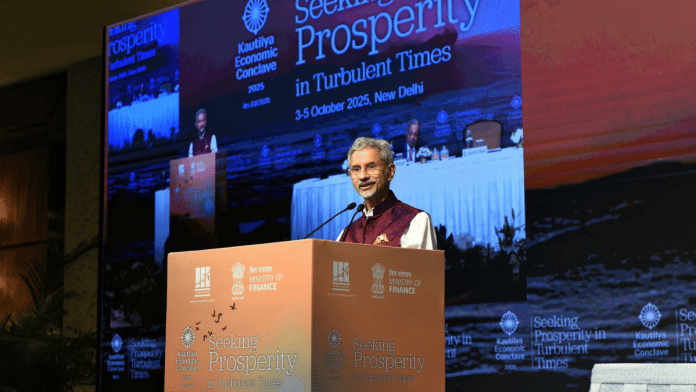New Delhi: As India and the US try to iron out differences over their trade deal, External Affairs Minister S. Jaishankar Sunday said that there needs to be “compromises” on both sides, but New Delhi has “certain red lines and priorities”, and it is “aware of them.”
Speaking at the closing session of the Kautilya Economic Conclave, a three-day economic summit organised by the Institute of Economic Growth and the Union Ministry of Finance, he said US tariffs on India are unfair but it should not blown “out of proportion”.
In his speech during the event—themed Seeking Prosperity in Turbulent Times—Jaishankar addressed a range of issues such as Trump’s trade tariffs on India, the global order being reshaped by the war, energy relations, changing US-Russia ties and questions about a growing ‘multipolar’ world.
“I think every generation, even every conference, thinks they’re going through unprecedented times,” joked Jaishankar as he began his speech. “But these times are truly unprecedented times—for production, trade, energy, and data in the world.”
Since the three-day event was dominated largely by discussions around Donald Trump’s trade tariffs and shifting power dynamics in the world, Jaishankar had to address India and the US’s trade ties and the 50 percent tariff imposed on India by the Trump administration.
“It is true that we have issues with the US today, because we don’t have a landing ground for trade discussions,” said Jaishankar. “In the meanwhile, they imposed tariffs on us, and then also imposed—quite unfairly—second tariffs for importing Russian oil,” he added.
While the external affairs minister said a trade agreement with the US was pertinent, he also asserted India needed to underscore its priorities before reaching any deal. “There need to be compromises on both ends, but there are certain red lines and priorities that India has, and we’re aware of them,” said Jaishankar. “But a trade deal is essential, since the US is a major partner.”
Jaishankar also cautioned against calling the India-US trade issues “catastrophic” or viewing them as anything more than they are. “I am not minimising the issue here, but let’s not let it percolate into every sector and blow it out of proportion,” said Jaishankar. “We need to see the trade issues in their particular context. Other parts of the US-India relationship are doing just fine.
Organised by the IEG and the finance ministry, the Kautilya Economic Conclave brought together economists, academics, and policymakers from around the world to discuss questions around Indian and global economic development.
This event was the fourth edition of the conclave. It was inaugurated on 3 October by Finance Minister Nirmala Sitharaman. It was attended by eminent personalities, including Shaktikanta Das, the Principal Secretary to the Prime Minister; Sanjay Malhotra, the Governor of RBI; and Harish Salve, senior advocate, Supreme Court.
Union Minister for Communications Jyotiraditya Scindia also addressed the gathering during a session on emerging technologies on 5 October.
Jaishankar was speaking as part of a panel discussion with N.K. Singh, the President of IEG, Jean Claude Trichet, former President of the European Central Bank, and Richard McGregor, Senior Fellow at the Lowy Institute, Australia.
Also Read: Jaishankar pitches for better ties with both US & China, outlines India’s approach
India in new world order
Jaishankar alluded to trends such as China’s dominance over global production channels and the US’ new role as a champion of fossil fuels, while setting the context for the present “turbulent” world order.
He also highlighted the tightening of global supply chains and addressed ongoing conflicts and military escalations, including those between Russia and Ukraine, Azerbaijan and Armenia, and Israel and Iran.
He connected these distinct global developments to a single main stream of thought, which was echoed by other speakers before him as well.
“The sentiment that characterises this new world order is the growth in the opposition to globalisation,” said the minister. “We’re seeing in real time the weakening of international rules, we’re seeing old alliances being revisited, and the general belief in the balance of power is lessening.”
In keeping with the theme of ‘prosperity’ in these times, Jaishankar said that India’s role is not just to defend its position in the world but to go beyond that. He stressed the need for India to align with multiple sources, keep its options open, and diversify the risk exposure.
“While we should aim to have as many productive relationships as possible, none of them should be exclusive so that they don’t prevent us from making new ones.”
“Our focus is currently to establish ties and Free Trade Agreements (FTAs) with non-competitive economies, such as the UK FTA,” he said. “This is also why we’re actively pursuing agreements with the EU, and also continuing negotiations with the US for a trade agreement since March.”
(Edited by Ajeet Tiwari)







Hello Mr Jaishankar, all that you have to tell is that socialist India doesn’t do trade deals and then you go to bed chanting long live socialism.